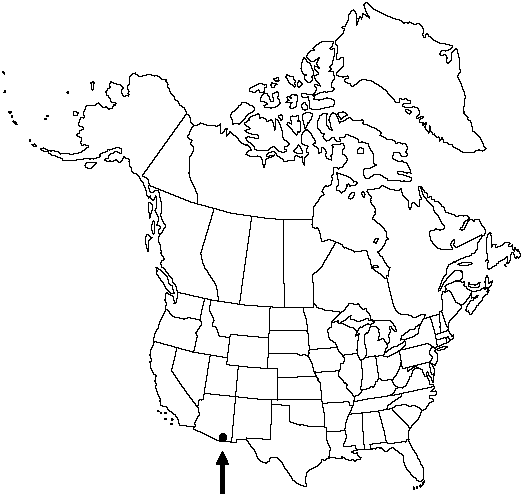Difference between revisions of "Asplenium exiguum"
Ferns S. India plate 146. 1864.
FNA>Volume Importer |
imported>Volume Importer |
||
| (7 intermediate revisions by 2 users not shown) | |||
| Line 17: | Line 17: | ||
}}<!-- | }}<!-- | ||
| − | --><span class="statement" id="st- | + | --><span class="statement" id="st-undefined" data-properties=""><b>Roots </b>not proliferous. <b>Stems</b> erect or ascending, unbranched; scales black throughout, narrowly deltate, 2–3 × 0.2–0.3 mm, margins mostly with widely spaced, shallow teeth. <b>Leaves</b> monomorphic. <b>Petiole</b> dark reddish brown throughout, dull, 1–3 cm, 1/10–1/6 length of blade; indument of black filiform scales. <b>Blade</b> lanceolate, 2-pinnate to 2-pinnate-pinnatifid, 4–10 × 1–3 cm, thin, sparsely pubescent; base tapering; apex acute to acuminate, often bearing minute, scaly, proliferous bud. <b>Rachis</b> basally reddish brown, fading to green in distal 1/2 to 3/4, dull, sparsely pubescent and with a few filiform scales. <b>Pinnae</b> 10–20 pairs, narrow, oblong; medial pinnae 5–12 × 4–7 mm; base acute to obtuse; margins coarsely incised; apex notched, bearing proliferous bud. <b>Veins</b> free, obscure. <b>Sori</b> 1–4 pairs per pinna, on both basiscopic and acroscopic sides. <b>Spores</b> 64 per sporangium. <b>2n</b> = 72.</span><!-- |
-->{{Treatment/Body | -->{{Treatment/Body | ||
| Line 23: | Line 23: | ||
|elevation=1200 m | |elevation=1200 m | ||
|distribution=Ariz.;Mexico;Asia in the Himalayas;Pacific Islands in the Philippines. | |distribution=Ariz.;Mexico;Asia in the Himalayas;Pacific Islands in the Philippines. | ||
| − | |discussion=<p>Asplenium exiguum has an interesting disjunct distribution, its range barely extending into the United States. Its vegetative propagation by buds scattered on the blade was reported by J. T. Mickel (1976).</p> | + | |discussion=<p><i>Asplenium exiguum</i> has an interesting disjunct distribution, its range barely extending into the United States. Its vegetative propagation by buds scattered on the blade was reported by J. T. Mickel (1976).</p> |
|tables= | |tables= | ||
|references= | |references= | ||
| Line 32: | Line 32: | ||
-->{{#Taxon: | -->{{#Taxon: | ||
name=Asplenium exiguum | name=Asplenium exiguum | ||
| − | |||
|authority=Beddome | |authority=Beddome | ||
|rank=species | |rank=species | ||
| Line 46: | Line 45: | ||
|publication year=1864 | |publication year=1864 | ||
|special status= | |special status= | ||
| − | |source xml=https:// | + | |source xml=https://bitbucket.org/aafc-mbb/fna-data-curation/src/2e0870ddd59836b60bcf96646a41e87ea5a5943a/coarse_grained_fna_xml/V2/V2_81.xml |
|genus=Asplenium | |genus=Asplenium | ||
|species=Asplenium exiguum | |species=Asplenium exiguum | ||
| − | |||
| − | |||
| − | |||
| − | |||
| − | |||
| − | |||
| − | |||
| − | |||
| − | |||
| − | |||
| − | |||
| − | |||
| − | |||
| − | |||
| − | |||
| − | |||
| − | |||
| − | |||
| − | |||
| − | |||
| − | |||
| − | |||
| − | |||
| − | |||
| − | |||
| − | |||
| − | |||
| − | |||
| − | |||
| − | |||
| − | |||
| − | |||
| − | |||
| − | |||
| − | |||
| − | |||
| − | |||
}}<!-- | }}<!-- | ||
-->[[Category:Treatment]][[Category:Asplenium]] | -->[[Category:Treatment]][[Category:Asplenium]] | ||
Latest revision as of 20:25, 5 November 2020
Roots not proliferous. Stems erect or ascending, unbranched; scales black throughout, narrowly deltate, 2–3 × 0.2–0.3 mm, margins mostly with widely spaced, shallow teeth. Leaves monomorphic. Petiole dark reddish brown throughout, dull, 1–3 cm, 1/10–1/6 length of blade; indument of black filiform scales. Blade lanceolate, 2-pinnate to 2-pinnate-pinnatifid, 4–10 × 1–3 cm, thin, sparsely pubescent; base tapering; apex acute to acuminate, often bearing minute, scaly, proliferous bud. Rachis basally reddish brown, fading to green in distal 1/2 to 3/4, dull, sparsely pubescent and with a few filiform scales. Pinnae 10–20 pairs, narrow, oblong; medial pinnae 5–12 × 4–7 mm; base acute to obtuse; margins coarsely incised; apex notched, bearing proliferous bud. Veins free, obscure. Sori 1–4 pairs per pinna, on both basiscopic and acroscopic sides. Spores 64 per sporangium. 2n = 72.
Habitat: Cliffs
Elevation: 1200 m
Distribution

Ariz., Mexico, Asia in the Himalayas, Pacific Islands in the Philippines.
Discussion
Asplenium exiguum has an interesting disjunct distribution, its range barely extending into the United States. Its vegetative propagation by buds scattered on the blade was reported by J. T. Mickel (1976).
Selected References
None.